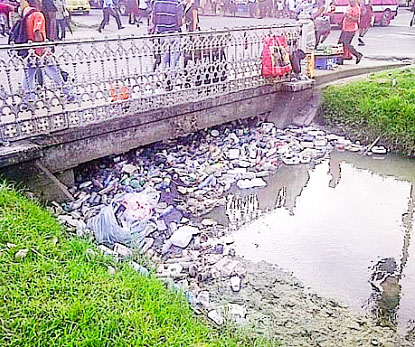The jury still appears to be out on last week’s official announcement that as of January 1 next year the Government of Guyana will bring into effect a full-fledged ban on the importation of Styrofoam. It is a decision that coincides with an accelerated environmental lobby here in Guyana the current focus of which is an energetic urban cleanup campaign driven collectively by central government and the Georgetown municipality.
Indiscriminate dumping, unsightly garbage pileups and flooding resulting from clogged waterways have long been the bane of urban existence and in each of these occurrences Styrofoam containers have been targeted as the villain.

Styrofoam is the trade name for a polystyrene foam product used for housing insulation. Polystyrene is a light-weight material, about 95% air, with excellent insulation properties and legendary popularity in the food and beverages industry in a range of containers including cups and other containers that keep beverages and foods hot or cold. Virtually leak-proof, they also travel well.
Ironically, these properties have resulted in Styrofoam containers being regarded as both saviour and villain among different sections of the population. For the food and beverage industry the containers have long been seen as a highly reliable replacement for the leaky, ‘drippy’ containers that had previously obtained. For the environmentally conscious and those who have long been railing against the unsightliness of Styrofoam beverage cups and food boxes deposited in just about every public place, the containers are a menace. When the rains come bringing with them the floodwaters, Styrofoam containers come in for more criticism.
Attempts by the previous political administration to phase out – or at least considerably restrict – the use of Styrofoam containers first surfaced just over two years ago only, it seemed, to be beaten back by an assertive lobby from the business community. The protestations against the banning of Styrofoam containers was rendered more effective by the fact that neither local manufacturers nor importers seemed able to make a sufficiently robust case for an appropriate replacement, the sole exception being Caribbean Containers Inc.
A ban on the importation of Styrofoam products which, eventually, was decided would come into effect in 2014 was set aside. There had also been talk about the imposition of stamp duty and environmental tax on Styrofoam containers though at no stage and despite the protestations of the environmental lobbyists, did it seem that the authorities were winning the battle to rein in the negative effects of the Styrofoam ‘menace.’
Charles Jonas, a local small business proprietor concedes that the Styrofoam container has survived the efforts of the environmental lobbyists to have it banned for the reason that a persuasive case has never really been made for an alternative. “It is because, environmentally unhealthy as it may be, Styrofoam containers are efficient in terms of the purpose that they are meant to serve. Ask the restaurant proprietors who thrive on takeaways and the supporters of those restaurants,” he said.
Adil Bacchus of the Essequibo-based Imam Bacchus and Sons which both sells Styrofoam containers and serves food from them in its snackette situated at Affiance, Essequibo Coast told Stabroek Business that when the intended ban was first announced in 2013 the company began searching for a biodegradable option. He said prohibitive prices proved to be a deterrent. From an environmental standpoint he supports the ban, pointing out that once the access to Styrofoam containers is removed traders in the food industry will then be operating on a level playing field as far as access to biodegradable options is concerned.
Sabrina Herman, the proprietor of Guy Pak Distributors of Second Street, Alberttown imports and markets Styrofoam containers. She is, she said, not indifferent to the negative effects of the non-biodegradable material and now seems resigned to seeking an alternative. The company, she said, has returned to cardboard, having recently imported one hundred bales of cardboard boxes. Sales are slow. For the time being, at least, Styrofoam still rules the roost. For Guy Pak Distributors, however, last week’s announcement of the ban from January 1 next year has brought some good news in the form of a number of enquiries about cardboard food boxes in stock. She said the problem is that cardboard is a costlier option.
Jewel Wills, co-proprietor of the Kingston-based Cottage Restaurant said she is an advocate of a green economy and has elected to use biodegradable containers despite their higher cost of between $50 and $60 per box.
The best-known local manufacturer of biodegradable containers, Caribbean Containers Inc (CCI) offers its Eco Pak line of 100% biodegradable food packaging, which became available shortly after the intended Styrofoam ban was announced in 2012. The company points out that due to the delays in the execution of the banning the company has not experienced the anticipated sales levels despite the fact that it has lowered its selling prices to a ‘sell at cost’ level in order to get the product to move faster.
“We are happy to learn that the ban will be implemented in January 2016 and remain committed to providing suitable environmentally friendly packaging,” the firm’s Chief Executive Officer Patricia Bacchus told Stabroek Business earlier this week. Bacchus, an attorney, says that issues such as the effectiveness of the ban through adequate testing and enforcement mechanisms, tax incentives for polystyrene free alternatives and other similar issues, will have to be assessed after the ban is imposed so as to inform the CCI’s strategic long-term decisions as it relates to Eco Pak.
By setting a firm date for the banning of the Styrofoam container, the government would appear to have come down on the side of the environmental lobby though the issue of finding a solution that responds adequately to the expanding needs of a the food industry, one of the fastest growing sectors in the country’s economy remains to be dealt with.




